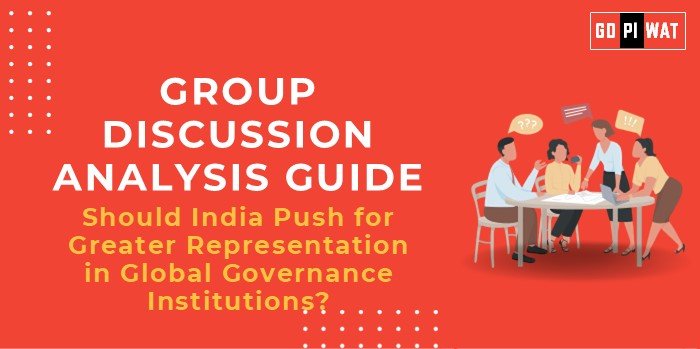📋 Group Discussion (GD) Analysis Guide
🌟 Should India Push for Greater Representation in Global Governance Institutions?
🌐 Introduction to the Topic
Opening Context: In an interconnected world, global governance institutions like the UN, IMF, and WTO shape economic, political, and security frameworks. As the world’s most populous country and the fifth-largest economy, India’s push for greater representation in these institutions is both timely and strategic.
Topic Background: Established post-WWII, global governance institutions were designed to maintain international stability. However, changing global dynamics and emerging economies like India have questioned their relevance and fairness in representation. Recent calls for reforms in the UN Security Council (UNSC) and IMF quotas highlight this debate.
📊 Quick Facts and Key Statistics
- 📈 India’s Economy: $3.73 trillion GDP in 2023 – 5th largest globally.
- 👮♂️ UN Contribution: India is the 3rd largest troop contributor to UN peacekeeping missions.
- 🏦 IMF Voting Share: India holds 2.75% of voting rights despite being the 5th largest economy.
- 🌍 G20 Presidency: India’s 2023 G20 presidency emphasized the need for inclusive global governance.
👥 Stakeholders and Their Roles
- 🇮🇳 Indian Government: Advocates for UNSC permanent membership and IMF voting reform.
- 🌐 Global Institutions: UN, IMF, World Bank – decision-makers in representation reform.
- 🌏 Emerging Economies: BRICS nations backing India’s aspirations.
- 🌎 Developed Nations: Often hesitant to dilute their dominance in these institutions.
🏆 Achievements and Challenges
- 🎯 Achievements:
- India’s G20 leadership showcased its ability to shape global agendas.
- Contribution to UN peacekeeping strengthens its claim for UNSC reform.
- Support from BRICS and African nations adds diplomatic leverage.
- ⚠️ Challenges:
- Resistance from P5 countries in UNSC reform.
- Low IMF and World Bank voting share relative to economic size.
- Political and bureaucratic inertia within these institutions.
🌍 Global Comparisons
- 🇨🇳 China: Holds 6.47% of IMF votes, reflecting its economic weight.
- 🇩🇪 🇯🇵 Germany and Japan: Economically influential but excluded from the UNSC permanent membership.
📋 Structured Arguments for Discussion
- ✔️ Supporting Stance: “India’s demographic, economic, and geopolitical strengths make its representation essential for a balanced and fair global governance system.”
- ❌ Opposing Stance: “Reforms might destabilize established structures, risking gridlock and inefficiency.”
- ⚖️ Balanced Perspective: “India’s representation is necessary, but reforms must ensure equitable transitions without undermining global stability.”
🛠️ Effective Discussion Approaches
- 🔍 Opening Approaches:
- Highlight historical significance: “Global governance structures designed post-WWII no longer reflect today’s realities.”
- Use statistical impact: “India, the 5th largest economy, holds only 2.75% IMF voting rights—clearly disproportionate.”
- 💬 Counter-Argument Handling:
- Acknowledge UNSC inefficiency but highlight how India’s inclusion could enhance legitimacy and decision-making.
- Discuss the importance of incremental reforms to avoid institutional gridlocks.
📈 Strategic Analysis of Strengths and Weaknesses
- 🟢 Strengths: Largest democracy, strong economic growth, G20 leadership experience.
- 🟡 Weaknesses: Limited current representation, resistance from P5 nations.
- 🔵 Opportunities: Leadership in Global South, leveraging diplomatic alliances.
- 🔴 Threats: Geopolitical tensions, bureaucratic resistance.
📚 Connecting with B-School Applications
- 🌏 Real-World Applications:
- Analyzing global governance informs strategies for leadership in multinational organizations.
- Case studies in diplomatic negotiations and economic reforms.
- 🤔 Sample Interview Questions:
- “What strategies can India adopt to secure UNSC permanent membership?”
- “How can India balance its national interests with global responsibilities?”
- 💡 Insights for Students:
- Highlight the importance of negotiation and coalition-building.
- Recognize the value of aligning strategic goals with global standards.


